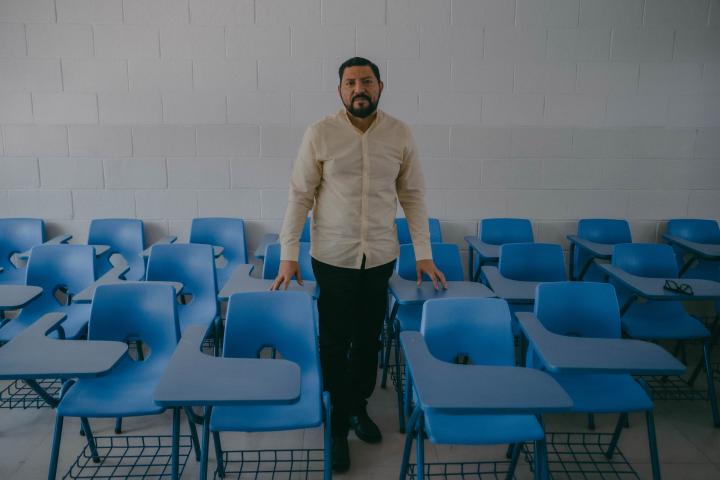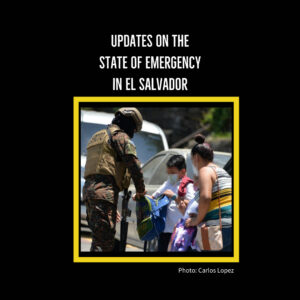Human Rights
Testimony: Torture in Prisons Under the State of Exception
(ESPAÑOL ABAJO)
The State of Exception has been in place since March of 2022 and removes due process and other rights. The Salvadoran news organization El Faro shares Alexander Eduvay Guzmán Molina’s experience of being detained at the start of the State of Exception. Like many people who have been detained under the policy, Alexander details systematic torture inside prison. This testimony adds to the growing documentation of state violence and human rights violations under the State of Exception, such as Cristosal’s comprehensive report.
Below is an excerpt from El Faro’s article sharing Alexander’s story. You can find the full article in English here and Spanish with audio here.
Schoolteacher Alexander Eduvay Guzmán Molina, one of the first people detained under the state of exception, languished in a dark and humid cell for four days after police and guards “welcomed” him to Izalco Prison with a beating on Wednesday, March 30, 2022.
In the darkness, he saw light. Many lights. He hallucinated that his mother and wife were in the cell by his side. Then, everything turned hazy and he thought he was in a desert, until the vomiting interrupted his delirium. “We only threw up a little bit, like dry-heaving saliva,” he remembers.
Guzman’s case is far from exceptional under El Salvador’s state of exception, as the teacher himself witnessed firsthand. On the morning of March 30, 2022, Guzmán, a teacher for over two decades who runs a small taxicab business on the side, watched as state agents beat his employee and fellow inmate, Marco Tulio Castillo Reyes, who was arrested alongside Guzmán and three more of his cab drivers three days earlier on charges of “illicit association.” Castillo would die in prison two months later. The teacher, the cab driver, and some 60 other people who entered Izalco Prison during the first week of the state of exception were beaten, kicked and punched by guards and police as part of their carceral initiation, Guzmán says.
What the teacher witnessed and experienced firsthand was not an isolated case of exceptional violence, but part of a documented pattern of state abuse and torture that took place in El Salvador’s prisons at least during the first weeks of the state of exception. His testimony explains why the corpse of Castillo Reyes showed obvious signs of torture when his family went to retrieve the body from Medicina Legal, the state medical examiner’s office.
Guzman’s account adds details to the reports on abuse in custody under the state of exception published by several national and international human rights organizations, such as Socorro Jurídico Humanitario, Cristosal, and Human Rights Watch. In a report on conditions in El Salvador published in April 2023, Amnesty International denounced the “ill-treatment and torture” of people arrested under the state of exception, as well as “the deaths in state custody of at least 132 people who at the time of their deaths had not been found guilty of any crime.”
According to the report, “some people released on probation reported witnessing guards and police beating prisoners to death, when seeking to extract a ‘confession’ that they were part of a gang structure or when inflicting a supposed punishment.” Amnesty’s findings are corroborated by other evidence: In August 2022, El Faro reported on the case of a man from northern El Salvador, Francisco Huezo López, who died in prison two months after his arrest. His body, like the 35 others released from prisons during that time, showed signs of torture.
Internal police documents obtained by El Faro suggest Guzmán was arbitrarily detained without evidence. His case appears alongside two others in an internal police email, under the category: “Cases that indicate an apparent abuse of authority.”
Guzmán is the assistant director of the Altavista secondary school in Ilopango, San Salvador. On the morning of March 27, 2022, some nine hours after the Legislative Assembly declared the state of exception —an emergency measure approved after negotiations between the Bukele administration and the country’s gangs collapsed, resulting in a mass killing spree perpetrated in retribution by the Mara Salvatrucha-13— he was arrested on charges of “illicit associations.”
After three days locked up in the Ilopango Jail, Guzmán was transferred to Izalco Prison, where police and guards beat and left him in a cell on the verge of death. In December of last year, after interviewing 1,100 people affected by the state of exception, Human Rights Watch and Cristosal reported that state security forces had committed rights violations including enforced disappearances, torture, deaths in custody, and hundreds of arbitrary detentions.
El Estado de Excepción está vigente desde marzo de 2022 y elimina el debido proceso y otros derechos. El medio salvadoreño de noticias El Faro comparte la experiencia de Alexander Eduvay Guzmán Molina al ser detenido al inicio del Estado de Excepción. Como muchas personas que han sido detenidas bajo esta política, Alexander explica la tortura sistemática dentro de la prisión. Este testimonio se suma a la creciente documentación sobre violencia estatal y violaciones de derechos humanos bajo el Estado de Excepción, como el informe integral de Cristosal.
A continuación se muestra un extracto del artículo de El Faro que comparte la historia de Alexander. Puedes encontrar el artículo completo en inglés aquí y en español con audio aquí.
El profesor Alexander Eduvay Guzmán Molina, uno de los primeros capturados por el régimen de excepción, agonizó en una celda oscura y húmeda durante cuatro días, tras la paliza de “bienvenida” que policías y custodios le dieron el miércoles 30 de marzo de 2022, cuando entró al penal de Izalco.En esa oscuridad vio luces, muchas luces. Alucinaba que su madre y su esposa estaban a su lado en la celda, luego todo se le volvió borroso y creyó estar en un desierto hasta que el vómito le interrumpió el delirio. “Sólo echábamos una liguilla, como saliva”, recuerda.
Guzmán, profesor desde hace 22 años, no es un caso excepcional del régimen de excepción, como él atestiguó. La mañana del 30 de marzo de 2022, el educador vio a agentes del Estado vapulear también al taxista Marco Tulio Castillo Reyes, de 38 años, uno de sus cuatro empleados arrestados el 27 de marzo de 2022 por agrupaciones ilícitas y que falleció dos meses después. El profesor, el taxista y unas 60 personas más que entraron al penal durante la primera semana del régimen de excepción recibieron macanazos, patadas y puñetazos de parte de los custodios y policías, como parte de su recibimiento carcelario.
Lo que Guzmán vio y vivió no habla de una jornada particularmente violenta, sino de un patrón de maltratos y tortura estatal ocurrida al menos durante las primeras semanas del régimen. El testimonio del profesor Guzmán explica por qué la familia del taxista Castillo Reyes recibió un cadáver con evidentes signos de tortura en Medicina Legal. Además, el relato agrega detalles a informes que han elaborado organizaciones como Socorro Jurídico Humanitario, Cristosal y Human Rights Watch. “Policías y soldados han cometido abusos de forma reiterada, en todo el país, y durante varios meses”, dice uno de los informes. En su reporte de abril de 2023, Amnistía Internacional denunció ‘el sometimiento a malos tratos y tortura’ a los capturados durante el régimen, ‘y la muerte de al menos 132 personas bajo custodia del Estado, quienes al momento de su muerte no habían sido declarados culpables de ningún delito’. Según esa institución, ‘algunas personas en libertad condicional relataron haber presenciado custodios y policías matando a presos a golpizas, con la intención de que ‘confesaran’ que eran parte de una estructura pandilleril, o como la aplicación de un supuesto castigo’. Y hay más evidencia: este medio reportó que en agosto de 2022, un empresario del norte del país, tras dos meses en prisión, murió. Su cadáver, como el de otros 35 cuerpos que salieron de prisiones a esa fecha, mostraba signos de tortura.
El Faro obtuvo documentos internos de la Policía que hablan de una detención arbitraria y sin pruebas en el caso del profesor Guzmán. En un correo interno de la institución, el caso aparece junto a otros dos bajo la categoría “Casos en los que al parecer hubo abuso de autoridad”.
El profesor Guzmán es subdirector del centro escolar Altavista y empresario de taxis. La mañana del 27 de marzo de 2022, unas nueve horas después de que la Asamblea Legislativa aprobara el régimen de excepción, él fue capturado bajo cargos de agrupaciones ilícitas. El régimen inició tras la ruptura de la negociación del gobierno de Nayib Bukele con las pandillas, que derivó en una masacre perpetrada por la Mara Salvatrucha-13. Después de estar tres días encerrado en la bartolina de Ilopango fue trasladado al penal de Izalco, donde fue recibido con la paliza que lo dejó moribundo. En diciembre del año pasado, tras entrevistar a 1,100 personas afectadas por el régimen de excepción, también Human Rights Watch y Cristosal concluyeron que las fuerzas de seguridad del Estado han cometido desapariciones forzadas, torturas, muertes bajo custodia y cientos de detenciones arbitrarias.
Photo credit/autor de la foto: El Faro




